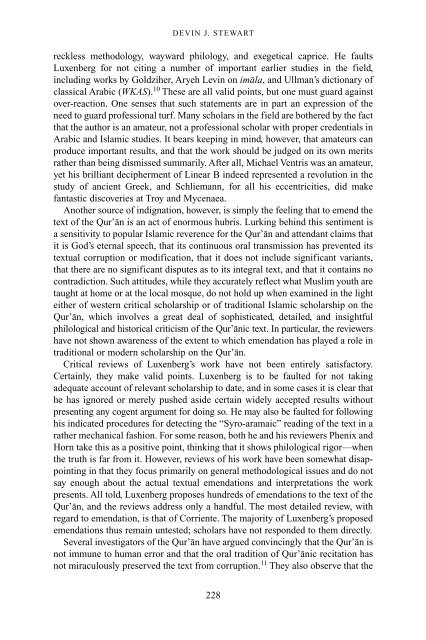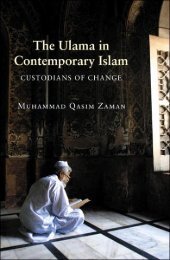The Qur'an in its historical context (pdf - Islam and Christian-Muslim ...
The Qur'an in its historical context (pdf - Islam and Christian-Muslim ...
The Qur'an in its historical context (pdf - Islam and Christian-Muslim ...
You also want an ePaper? Increase the reach of your titles
YUMPU automatically turns print PDFs into web optimized ePapers that Google loves.
DEVIN J. STEWART<br />
reckless methodology, wayward philology, <strong>and</strong> exegetical caprice. He faults<br />
Luxenberg for not cit<strong>in</strong>g a number of important earlier studies <strong>in</strong> the field,<br />
<strong>in</strong>clud<strong>in</strong>g works by Goldziher, Aryeh Lev<strong>in</strong> on imala, <strong>and</strong> Ullman’s dictionary of<br />
classical Arabic (WKAS). 10 <strong>The</strong>se are all valid po<strong>in</strong>ts, but one must guard aga<strong>in</strong>st<br />
over-reaction. One senses that such statements are <strong>in</strong> part an expression of the<br />
need to guard professional turf. Many scholars <strong>in</strong> the field are bothered by the fact<br />
that the author is an amateur, not a professional scholar with proper credentials <strong>in</strong><br />
Arabic <strong>and</strong> <strong>Islam</strong>ic studies. It bears keep<strong>in</strong>g <strong>in</strong> m<strong>in</strong>d, however, that amateurs can<br />
produce important results, <strong>and</strong> that the work should be judged on <strong>its</strong> own mer<strong>its</strong><br />
rather than be<strong>in</strong>g dismissed summarily. After all, Michael Ventris was an amateur,<br />
yet his brilliant decipherment of L<strong>in</strong>ear B <strong>in</strong>deed represented a revolution <strong>in</strong> the<br />
study of ancient Greek, <strong>and</strong> Schliemann, for all his eccentricities, did make<br />
fantastic discoveries at Troy <strong>and</strong> Mycenaea.<br />
Another source of <strong>in</strong>dignation, however, is simply the feel<strong>in</strong>g that to emend the<br />
text of the Qur’an is an act of enormous hubris. Lurk<strong>in</strong>g beh<strong>in</strong>d this sentiment is<br />
a sensitivity to popular <strong>Islam</strong>ic reverence for the Qur’an <strong>and</strong> attendant claims that<br />
it is God’s eternal speech, that <strong>its</strong> cont<strong>in</strong>uous oral transmission has prevented <strong>its</strong><br />
textual corruption or modification, that it does not <strong>in</strong>clude significant variants,<br />
that there are no significant disputes as to <strong>its</strong> <strong>in</strong>tegral text, <strong>and</strong> that it conta<strong>in</strong>s no<br />
contradiction. Such attitudes, while they accurately reflect what <strong>Muslim</strong> youth are<br />
taught at home or at the local mosque, do not hold up when exam<strong>in</strong>ed <strong>in</strong> the light<br />
either of western critical scholarship or of traditional <strong>Islam</strong>ic scholarship on the<br />
Qur’an, which <strong>in</strong>volves a great deal of sophisticated, detailed, <strong>and</strong> <strong>in</strong>sightful<br />
philological <strong>and</strong> <strong>historical</strong> criticism of the Qur’anic text. In particular, the reviewers<br />
have not shown awareness of the extent to which emendation has played a role <strong>in</strong><br />
traditional or modern scholarship on the Qur’an.<br />
Critical reviews of Luxenberg’s work have not been entirely satisfactory.<br />
Certa<strong>in</strong>ly, they make valid po<strong>in</strong>ts. Luxenberg is to be faulted for not tak<strong>in</strong>g<br />
adequate account of relevant scholarship to date, <strong>and</strong> <strong>in</strong> some cases it is clear that<br />
he has ignored or merely pushed aside certa<strong>in</strong> widely accepted results without<br />
present<strong>in</strong>g any cogent argument for do<strong>in</strong>g so. He may also be faulted for follow<strong>in</strong>g<br />
his <strong>in</strong>dicated procedures for detect<strong>in</strong>g the “Syro-aramaic” read<strong>in</strong>g of the text <strong>in</strong> a<br />
rather mechanical fashion. For some reason, both he <strong>and</strong> his reviewers Phenix <strong>and</strong><br />
Horn take this as a positive po<strong>in</strong>t, th<strong>in</strong>k<strong>in</strong>g that it shows philological rigor—when<br />
the truth is far from it. However, reviews of his work have been somewhat disappo<strong>in</strong>t<strong>in</strong>g<br />
<strong>in</strong> that they focus primarily on general methodological issues <strong>and</strong> do not<br />
say enough about the actual textual emendations <strong>and</strong> <strong>in</strong>terpretations the work<br />
presents. All told, Luxenberg proposes hundreds of emendations to the text of the<br />
Qur’an, <strong>and</strong> the reviews address only a h<strong>and</strong>ful. <strong>The</strong> most detailed review, with<br />
regard to emendation, is that of Corriente. <strong>The</strong> majority of Luxenberg’s proposed<br />
emendations thus rema<strong>in</strong> untested; scholars have not responded to them directly.<br />
Several <strong>in</strong>vestigators of the Qur’an have argued conv<strong>in</strong>c<strong>in</strong>gly that the Qur’an is<br />
not immune to human error <strong>and</strong> that the oral tradition of Qur’anic recitation has<br />
not miraculously preserved the text from corruption. 11 <strong>The</strong>y also observe that the<br />
228



